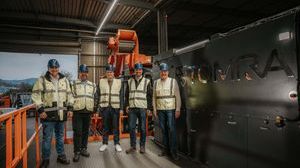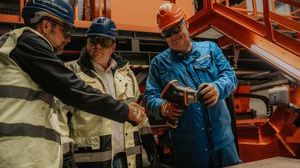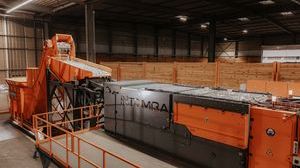TOMRA Recycling and Gerhard Lang Recycling GmbH

TOMRA’s AUTOSORT™ PULSE now allows Gerhard Lang Recycling GmbH to produce high purity 5xxx and 6xxx aluminium scrap.
The German metal recycling company, Gerhard Lang Recycling GmbH has become one of the first companies globally to implement BMRA service member TOMRA Recycling’s AUTOSORTTM PULSE system for the precision sorting of aluminium alloy stamping scrap generated from automotive production. Installed at its metals sorting plant in southwestern Germany, it is part of a research project funded by the German Federal Ministry for Economic Affairs and Climate Action.
The KANAL project* is an ambitious initiative aimed at closing the loop on aluminium scrap generated in automotive production. TOMRA, Gerhard Lang Recycling GmbH, Pforzheim University of Applied Sciences and engineers from Jeanvré have teamed up for the 3.9 million euro-funded project to prove that aluminium production scrap can be effectively sorted and transformed into high-quality secondary aluminium. The consortium is using TOMRA’s dynamic laser-induced plasma spectroscopy (Dynamic LIBS) technology. Gerhard Lang Recycling GmbH is both a research and field validation partner in this pioneering project.
Sorting of 5xxx and 6xxx aluminium wrought alloys

As part of the research project Kanal, the Gerhard Lang Recycling and TOMRA teams together with other partners aim to demonstrate the feasibility of closed-loop recycling for aluminium production scrap.
The plant’s infeed material consists of stamping scrap – the excess metal material that is removed during the metal stamping process – generated during the production of car parts and panels. While highly efficient, the stamping process inevitably generates significant amounts of scrap, with an estimated 30-50% of the material being discarded. The aluminium scrap comprises a mixture of 5xxx (high-magnesium) and 6xxx (low-magnesium) aluminium wrought alloys that are employed in different components within automotive production.
Upon arrival at Gerhard Lang Recycling GmbH's metals sorting plant in Gaggenau, the material is shredded before undergoing a multi-stage magnetic separation process to remove the ferrous metals. In a next step, the non-ferrous material is then fed into the AUTOSORT™ PULSE for advanced sorting.
Prior to the installation of the AUTOSORT™ PULSE unit, the Gerhard Lang Recycling GmbH team sold the mixed material to aluminium manufacturers immediately after the shredding process as there was no efficient solution on the market to separate the high- and low-magnesium aluminium alloys. With the AUTOSORT™ PULSE now in place, and thanks to TOMRA’s dynamic laser-induced breakdown spectroscopy (Dynamic LIBS) technology, these alloys are sorted into different products, allowing Gerhard Lang Recycling GmbH to produce exceptionally high purity 5xxx and 6xxx aluminium scrap.
Highly advanced dynamic laser detection

The purity levels that Gerhard Lang Recycling achieves exceed 95% and can potentially reach 97%, making the material suitable for use in the production of aluminium without downgrading.
Given the alloys’ identical appearance and density, traditional sorting methods are ineffective. However, the AUTOSORT™ PULSE separation process is based on the precise analysis of the elemental composition of each material and on highly advanced dynamic laser detection, making it capable of distinguishing between alloys.
Additionally, object singulation allows the AUTOSORT™ PULSE to accurately identify and separate even overlapping and adjacent materials, maximising yield and efficiency in the sorting process. Its 3D object scanning feature recognises the shape, height and position of the object and identifies the ideal shooting point for the Dynamic LIBS laser. This laser offers two focus modes: multi-point where the laser shoots in a line across the sample and single-point where the laser drills down into a specific spot, providing ideal detection conditions. The latter, developed by TOMRA, has demonstrated superior performance in tests.
Another key benefit of AUTOSORTTM PULSE is its ability to minimise contamination and subsequently enhance the value and marketability of the recycled materials. The system's precision sorting reduces the risk of cross-contamination, safeguarding the integrity of the recycled materials and ensuring that they are suitable for their intended applications.
Boosting purity levels

At the core of the system is TOMRA’s Dynamic LIBS solution, an in-house developed, advanced laser technology that separates the alloys based on the elemental composition.
Gerhard Lang Recycling GmbH consulted with TOMRA’s metals experts prior to investing in the plant’s new aluminium sorting process. The project's development spanned several years, with initial discussions beginning around 2018.
Maximilian Lang, Managing Director at Gerhard Lang Recycling GmbH, comments: “With the integration of AUTOSORT™ PULSE, we are able to process a throughput of around 4-7 tons per hour and achieve exceptionally high purity levels, exceeding 95% and potentially reaching 97%. As a result, our material is suitable for use in the production of aluminium without downgrading. We can now sell the recovered materials to leading aluminium manufacturers and recyclers for direct integration into the production of new aluminium alloys. What’s more, we are considering the potential to explore additional applications for other aluminium alloys.”
Frank van de Winkel, Market Strategy Manager – Metal at TOMRA Recycling, adds: “This is a very exciting project for TOMRA to be involved in, and we are delighted that Gerhard Lang Recycling GmbH is reaping the benefits that our AUTOSORT™ PULSE can offer. With the European Union's commitment to climate neutrality by 2050, as outlined in the Green Deal, and the specific target of a 55% reduction in greenhouse gas emissions by 2030 under the ‘Fit for 55’ initiative, there has never been a more crucial time to explore ways of making the aluminium supply chain more sustainable.
“Our AUTOSORT™ PULSE system empowers aluminium manufacturers to enhance the utilisation of recycled aluminium in their production processes. This innovative solution unlocks access to previously untapped scrap sources, enabling the recovery of high-quality, ‘alloy-true’ recycled aluminium. By preventing downcycling and conserving material value, we are closing another gap towards full material circularity. The successful implementation of our technology at Gerhard Lang Recycling GmbH’s plant demonstrates the feasibility of closed-loop recycling for production scrap and paves the way for a less carbon-intensive aluminium supply chain.”
To see TOMRA’s AUTOSORT™ PULSE in action and learn how it works at Gerhard Lang Recycling GmbH’s sorting plant, click here.
*KANAL stands for ‘Kreislaufsystem für funktionales Aluminium-Neuschrottrecycling aus der Automobilproduktion mittels LIPS," which translates to "Circular System for Functional Aluminium Scrap Recycling from Automotive Production Using LIBS." Project Number (Förderkennzeichen) 03LB4015B and name: Verbundvorhaben: KANAL – Kreislaufsystem für funktionales Aluminium-Neuschrottrecycling aus der Automobilproduktion mittels LIPS.
KANAL research project goals:
Step 1 – separation of 5xxx and 6xxx aluminium post-production scrap
Step 2 – separation of individual 5xxx and 6xxx alloys
Step 3 – separation of other post-consumer aluminium scrap
